One of the first conversations I have with my parents of dyslexic kids is “And your child should be listening to audio books.” Almost like clockwork, they respond, “But I want to make sure she still learns to read.”
Maybe this is a concern you are struggling with right now. Let me help allay your fears.
First of all, one of the hallmarks of dyslexia is a discrepancy between reading level and oral language level. Often, in fact, these kiddos are really verbal and have been forever. I can’t tell you how many parents tell me, “He has a great vocabulary and has always impressed people when they talk with him. That’s why we were so shocked when he started having trouble reading.”
This discrepancy means that children with dyslexia can comprehend books that they hear at a much higher level than they can read. So, to keep developing their oral language, including their vocabulary and their understanding of literary syntax, they need to be exposed to books at their oral comprehension level, rather than being limited to books they can read independently.
Since one of the greatest long-term disadvantages children with dyslexia face is the growing gap in vocabulary, literate language and content compared to their fluent reading peers, it is especially important to supplement what they can read with literature they can listen to.
Secondly, kids become better, more fluent readers by reading books that are easy for them, not books that are so challenging they are frustrating. In fact, research says that the sweet spot is when a child can easily decode 95% or more of the words in a book. If a child struggles to read more than 5% of the words, the book is too hard. So, even though the goal is for your child to pick up Harry Potter or Divergent on their own, the way to get them there is to let them choose easy books now, so that they build the fluency (speed and accuracy) to be able to read those challenging books later.
And, I hate to tell you this, but they need to reread those easy books…over and over and over. When parents tell me, “Just get my kid to read something, anything, other than Magic Treehouse! He has those memorized!” I tell them, “Actually, that’s great. Let him read them to his heart’s content.” Yes, I know that may mean you now have all the books memorized as well, but such is what it takes for your child to get really automatic.
Finally, in this day and age, it is important to realize that listening to an audio book should be considered real reading. Ben Foss, author of The Dyslexia Empowerment Plan, creator of Headstrong Nation, inventor of the Intel Reader, and dyslexic advocate extraordinaire, argues that we need to get over the feeling that listening to books is somehow cheating or not real reading. Dyslexic himself, Foss points out that we understand that blind people read with their fingers. We also need to understand that many people with dyslexia read with their ears. He encourages the use of the terms “eye reading,” “ear reading” and “finger reading” to encompass the variety of ways to read.
Foss advocates kids with dyslexia learning how to listen to super-fast text, so that they can ear read a book as fast as the average eye reader can read. He points out that many dyslexic brains actually process speeded-up text better than do non-dyslexic brains.
Supporting this dyslexia-friendly understanding of reading is a burgeoning understanding of dyslexia itself as being not so much a “learning” disorder, as a “print” disorder. As I have mentioned in previous posts, Dr. David Rose points out that all learning disabilities are in truth a function of normal human neurodiversity in a specific context that fits badly. In the case of dyslexia, the disability resides in part in the print. Seen through this lens, audio books are a logical and easy piece of Universal Design for Learning (UDL), an approach focused on giving diverse learners access to content.
Without minimizing the challenges of dyslexia, I have to say, this is a pretty good time in history to be dyslexic. Your average computer and smart device can read to you, Siri is ready to translate your words into action and programs like Kurzweil and Dragon Naturally Speaking do an even better job of translating text to speech and speech to text. Textbook publishers now routinely include an audio cd or dvd in with all their books across the grade levels and the curriculum. And web sites like Learning Ally https://www.learningally.org/ and Audible.com http://www.audible.com/ offer almost any book you would need on audio. 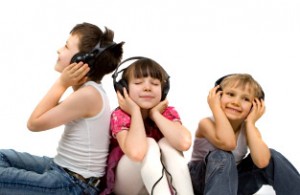
So, let me repeat my standard recommendation. Your child should be listening to books on audio. There is no reason that having dyslexia should mean that a kid can only be exposed to Mac and Tab or Magic Treehouse when her friends are all reading and discussing Divergent or The Hunger Games. Listening to audio books allows them access to the vocabulary, literary language and content that they need to keep growing and developing while they get the explicit phonics instruction and the fluency practice that will help their eye reading catch up with their ear reading.
copyright Diana Kennedy 2014
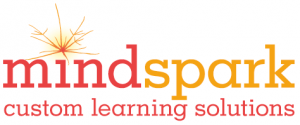
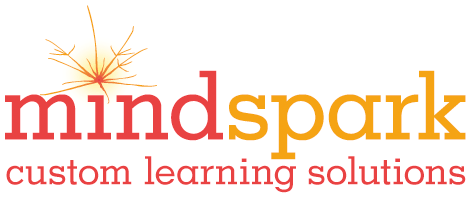
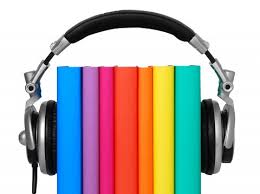
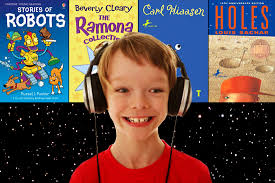
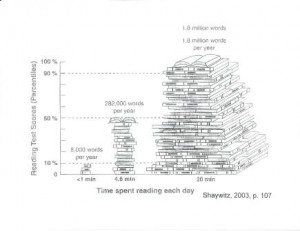

Don’t forget, your public library probably has audiobooks you can borrow for free, on CDs and often also downloadable e-audiobooks!
Excellent point! Thanks!
[…] -More- […]
We love the audio book. My son has always loved stories and I worried when I wasn’t reading to him that he wasn’t being exposed to the beautiful language and enchanting stories he enjoyed. A Christmas subscription to audible has been a gift that keeps giving, especially when he’s tired of a night and wants to unwind with a story, but decoding is too much energy. Thanks for this validation of our experience.
Absolutely! Happy to give you the validation for what turns out is not only ok, but really important! Good job!
It’s too bad that the people who create and allow reading adaptations on testing don’t see this in the same way you do. If my students could listen, they would pass many more of the testing requirements.
I agree. It undermines a test’s validity to make success on it dependent on decoding, unless it is a test for decoding. Otherwise, give access to people who need access.
I totally agree with you and their self esteem would not be crushed.
Absolutely!
[…] One of the first conversations I have with my parents of dyslexic kids is “And your child should be listening to audio books.” Almost like clockwork, they respond, “But I want to make sure she sti… […]
Yes audio books are a great way to access books that are beyond the ready reach of those with dyslexia. They also help to build up fluency when used as ‘read along’ books.
Great idea!
Absolutely. If the student is near the reading speed of the audio, it can be very useful. If they are too far behind, it can be distracting. Thanks!
[…] One of the first conversations I have with my parents of dyslexic kids is “And your child should be listening to audio books.” Almost like clockwork, they respond, “But I want to make sure she sti… […]
Absolutely!’Universal Design for Learning’ is the most valid and justifiable argument to accommodate people dyslexia. It is unfair for our society to be deprived from the talent of people with dyslexia; since students with dyslexia are challenged in the development of their literacy skills and consequently disappointed and impaired to reach their potential.
It’s true. These kids tend to be the visionary/big picture people we really need. As a society, we *have* to stop thinking about school as a gate keeper and start thinking about developing all students’ strengths, whatever it takes. The narrower the view, the more society misses out.
Great article! Please don’t leave out persons with continuing issues resulting from head trauma. My daughter has always been the reluctant reader in a family of avid readers, but when she suffered a concussion in 3rd grade, it magnified. She was left with light sensititvity, difficulty focusing for extended periods of time, migraines and for a while, difficulty with word-finding in conversation.
Thankfully, now in 6th grade, most of her issues rarely surface, but she is older and more capable of describing what she experiences. We were already concerned that she might be dyslexic when younger, but the school never saw any issues- she is a very bright and conversational child. After the injury, she seems to have lost her ability to compensate. As a middle school student, academeic demands are more rigorous. She LOVEs her audiobooks… We borrow audiobooks from our library (digitally with OverDrive, as CDs and her favorite -PlayAways.) It is such a joy to sit and discuss what she is reading now. We even “fight” who gets the books first!
Thanks for the reminder. More and more research is finding that what we used to think were minor concussions with no effect actually do have effects. For the light sensitivity, sometimes color overlays work on the paper, because it cuts down the contrast. I have to remember to suggest OverDrive. You are the second parent who has mentioned it! Thanks!
Great post on Audio Books! I just have one thing to add about audio books. I have a child who isn’t dyslexic but she struggles with reading. My daughter has visual perception issues and many, many years ago, she “shut down” with reading when we got to chapter books. The type was just too small and there wasn’t enough “white space” between the lines. So as a parent advocate, I called my local library to see if there was LARGE PRINT books similar to ones available for senior citizens but with juvenile content. They all thought I was crazy. Oh, this is the role of parent advocate. :-) Fast forward many years and many technological advances. We now use the Overdrive app on the iPad and take out books for FREE from the library so we can enlarge the text. Then one day, I heard at a tech parent ed event that one of the Amazon products (I think it was the Fire) would let you purchase the print AND audio book at the same time.) This is where the parent advocate gets creative…..so, my daughter had already checked out a PRINT book on her iPad with the Overdrive app for FREE and then I checked out the AUDIO version on our old iPad 1 (who knew that an old iPad could even be useful in today’s age?) on the Overdrive for FREE. So the iPad 1 had the audio book that reads to my daughter while she followed along on the print version on the iPad 3. It’s probably not the easiest of solutions to use 2 iPads but I throw this out there as a possible solution. As parents of kids with special needs, we spend so much money on “stuff” that I want to share the free stuff with you. Also, don’t forget many of these libraries have Audio versions of many books for free and they are always expanding their selections. Happy Reading to all!
Thanks! Great ideas. And free is always good. I’ll have to check out overdrive.
Increased fluency with increased text size and reading problems that develop when print size is reduced are good indicators that distinguish dyslexia from what I call visual dyslexia. My personal theory is that rather than a visual perception issue it is a sensitivity to visual noise caused by autofluorescent proteins in the eye which absorb some visual data (photons)at specific wavelengths of light effectively deleting it and then emit it on a new pathway to overwrite legitimate visual data at spots on the retina as visual noise rather than accurate visual data The result is a small scale visual noise problem that causes visual dyslexia symptoms.
The good news is that there are is a specific list of wavelengths associated with the different proteins that can all be filtered out at once with a filter designed for that purpose and can be thought of as a universal visual dyslexia filter. The filter extinguishes the visual noise and allows for reading at normal ( small )print sizes.
The filter is called See Right Dyslexia Glasses and is available at http://www.dyslexiaglasses.com/visualdyslexiasolution.html . While I don’t generally consider audio books necessary for visual dyslexics as See Right Dyslexia Glasses will remove the visual problems , I do have a free resources page of links to several audio book sites and other free resources for dyslexics who won’t be helped by my glasses. The free resources link is http://www.dyslexiaglasses.com/links.html .
I am glad to see that you understand your daughter has a visual problem and is not dyslexic. Almost all the visual dyslexics visiting my site have been diagnosed incorrectly as being dyslexic and are often delayed by years seeking help for dyslexia problems that they do not have.
I only ever make one claim and that is See Right Dyslexia Glasses remove visual problems that make reading difficult. Dyslexics who see text fine have no need of the glasses and can expect no benefit from a visual intervention that allows seeing text normally.
I agree that for some kids with a visual component to their dyslexia, large, sans-serif fonts can help. Your glasses sound similar to Irlen lenses. From the research I have seen, there is no conclusive evidence that it helps. Do you have any research showing efficacy for your glasses?
Diana, Great article. My 12 year old son was not “officially” diagnosed with dyslexia but he is on the cusp (according to the school diagnostician, and of course didn’t qualify for assistance). He LOVES listening to audiobooks. He does read to himself and seems to understand the material, but it is nice to hear that it is “OK” that he reads “with his ears!”
Glad to offer reassurance. Especially this day and age, where you aren’t condemning him to need some person walking with him all the time to read to him. It’s great!
Great article! Taking away the print is the key. These children still need to build brain power so audiobooks make perfect sense. They can still work on comprehension, main idea, word meaning, etc.